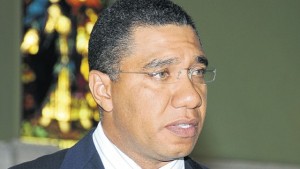
Andrew Holness
UNITED NATIONS (CMC) – Several Caribbean Community (Caricom) leaders will address the United Nations General Assembly (UNGA) later this week as UN Secretary General António Guterres called for a “renewed commitment to a rules-based global order”.
Guterres spoke of key themes for discussion during the 73rd session of the UNGA that got underway here yesterday.
He said that with 84 heads of State and 44 Government leaders taking part in the debate this week, it showed that the UN was still “the world’s indispensable forum for international cooperation”.
According to the UN’s provisional list of speakers, the prime ministers of Haiti, Jamaica, St Lucia, St Kitts and Nevis, The Bahamas, Antigua and Barbuda, St Vincent and the Grenadines, and Barbados are expected to participate in the General Assembly debate this week.
The vice-president of Guyana and foreign ministers from Suriname, Trinidad and Tobago, Belize, Dominica and Grenada will do so in the absence of the president, as in the case of Guyana, and the prime ministers for the others.
Most Carisom countries will take part in the debate on Friday with Guyana, St Lucia, St Kitts and Nevis, The Bahamas, Antigua and Barbuda, St Vincent and the Grenadines, and Barbados expected to address the forum.
Haiti and Jamaica, represented by Prime Minister Andrew Holness, will address the General Assembly on Thursday; and Suriname, Trinidad and Tobago, Belize, Dominica and Grenada will do so on Saturday.
The prime ministers of St Kitts and Nevis, Jamaica, St Vincent and the Grenadines, and Barbados will also address, on Thursday, the General Assembly’s Third High-Level Meeting on the Prevention and Control of Non-Communicable Diseases (NCDs).
Grenada’s Foreign Affairs Minister Peter David will also address that high-level meeting.
One year on from his launch of a system-wide gender parity strategy, Guterres told reporters here that team leaders in the field are now made up of an equal number of men and women, and that there have never been as many female heads and deputy heads of peace operations in UN history.
“Our aim is to shift the long-standing power imbalances that have held the United Nations back, and to elicit the best contributions from all the staff to take the Organization forward,” he said. “And such a shift will also help to address sexual harassment.”
The UN chief said the global body’s focus was “on prevention, responding rapidly to allegations, supporting victims through their trauma and ensuring accountability for perpetrators”.
Guterres was yesterday expected to launch a new strategy called “Youth2030”, as well as an initiative named “Generation Unlimited”, both designed to help young people secure quality education and decent jobs, and contribute to preventing radicalisation.
He is also expected to launch his strategy for financing the UN’s 2030 Agenda for Sustainable Development.
The UN said a surge in investment for the Sustainable Development Goals is needed, as well as a systemic change in the way the world does business, “and a clampdown on illicit capital flows such as money laundering and tax evasion”
